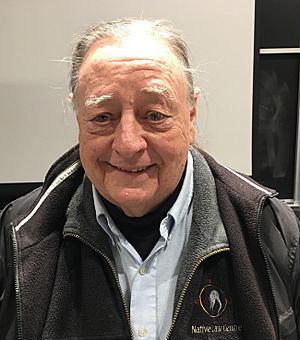James (Sákéj) Youngblood Henderson facts for kids
Quick facts for kids
James (Sákéj) Youngblood Henderson
|
|
|---|---|

Professor James (Sákéj) Youngblood Henderson in January 2017
|
|
| Born | December 20, 1944 Ardmore, Oklahoma, U.S.
|
| Nationality | Chickasaw Nation, American |
| Alma mater | Harvard Law School (Juris doctor) |
| Spouse(s) | Marie Battiste |
James (Sákéj) Youngblood Henderson, born on December 20, 1944, is an important American lawyer, advocate, and teacher. He has dedicated his life to protecting the rights and cultures of Indigenous peoples around the world. He is known for his work in Indigenous law, which focuses on the legal systems and rights of Native communities.
Contents
Early Life and Background
James Youngblood Henderson was born in Ardmore, Oklahoma. He is a member of the Chickasaw Nation through his father's family. He also has Cheyenne ancestry. Growing up, he experienced poverty. This experience inspired him to work towards ending poverty for all Indigenous peoples. It became a major goal in his life.
Education and Early Activism
When he was a college student, James Henderson was the vice-president of the American National Indian Youth Council. This group worked to help young Indigenous people. He saw how the Civil Rights Movement was fighting for equal rights for African Americans. He thought this movement could be a good example for Indigenous people to gain their own rights.
He later attended Harvard Law School, which is a very famous law school. In 1974, he made history by becoming one of the first Native Americans to earn a Juris Doctor degree. This degree means he became a lawyer.
James Henderson is married to Mi'kmaq educator Marie Battiste. Together, they have a son, Jaime Battiste, who is now a Member of Parliament in Canada.
Working for Indigenous Rights
After finishing law school, James Henderson immediately started working to help Indigenous communities. One of his first big cases helped his father's family regain important legal rights. Since then, he has worked tirelessly to protect Indigenous heritage and culture using legal methods.
He has worked with many important groups, including the Government of Canada, the Mi'kmaq Nation, and the United Nations. He has also helped other First Nation governments. His work often involves making sure Indigenous peoples' traditional lands and ways of life are respected and protected by law.
Teaching Law
Besides his legal work, James Henderson has also taught law at several well-known universities. He has taught at places like Stanford University, Berkeley, and Harvard University. He has shared his knowledge of Indigenous law with students across North America.
Work in Canada
In 1978, James Henderson moved to Canada. His wife, Marie Battiste, was asked by the Grand Captain of the Mi'kmaq people to create a special education program in Nova Scotia. This program would teach in both English and the Mi'kmaq language.
While in Canada, Henderson began working closely with the Mi'kmaq Nation. He helped them write down their land titles and represented them in legal cases. From 1978 to 1993, he also advised the Mi'kmaq Nation and the Assembly of First Nations on important constitutional matters in Canada.
International and Advisory Roles
Because of his deep understanding of Indigenous legal issues, James Henderson was asked to serve on many important boards. He was on the advisory board for the Canadian Minister of Foreign Affairs. He was also a member of the Canadian Commission for UNESCO, which deals with culture, communication, and information, from 2000 to 2010. He also joined an expert group that advised on international cultural diversity.
Henderson also worked to protect Indigenous Nations' rights during the Kelowna Accord, which was an agreement in Canada to improve the lives of Indigenous peoples. He also worked with the Four Directions Council, a group connected to the United Nations.
Throughout his career, he has helped write many legal documents and books. These writings aim to protect Indigenous heritage, culture, and legal rights. One of his most important contributions was helping to draft the UN Declaration on the Rights of Indigenous Peoples. This is a major document that outlines the rights of Indigenous peoples worldwide.
Today, James Henderson works in Canada as the Research Director of the Native Law Centre. He is also a professor of Indigenous law at the University of Saskatchewan College of Law.
Awards and Recognition
James Henderson has received many awards and honors for his excellent work in international law and his strong commitment to justice for Indigenous peoples.
- In 2005, he received an award from the Indigenous Peoples Council on Biocolonialism.
- In 2006, he was given a National Aboriginal Achievement Award (now called the Indspire Award) for his work in Law and Justice.
- In 2007, he received an Honorary Doctorate of Law from Carleton University.
- In 2013, he was named a Fellow of the Royal Society of Canada. This is a very high honor for Canadian scholars and artists.
Selected Writings
James Henderson has written many important books and articles about Indigenous law. Here are some of them:
- Indian Statehood Reconsidered (1974)
- Tribal Administration of Natural Resource Development (1975) with Russel Lawrence Barsh
- The Road: Indian Tribes and Political Liberty (1982) with Russel Lawrence Barsh
- Mikmaq State Papers (1984) with Mik'maq Indians, Russel Lawrence Barsh, and Bernie Francis
- First Nations' Legal Inheritance (1991)
- The Míkmaw Concordat (1997)
- Aboriginal Tenure in the Constitution of Canada (2000) with Marjorie Lynne Benson and Isobel Findlay
- Aboriginal Jurisprudences Protects Aboriginal Heritages (2002)
- Treaty Rights in the Constitution of Canada (2007)
 | Anna J. Cooper |
 | Mary McLeod Bethune |
 | Lillie Mae Bradford |

